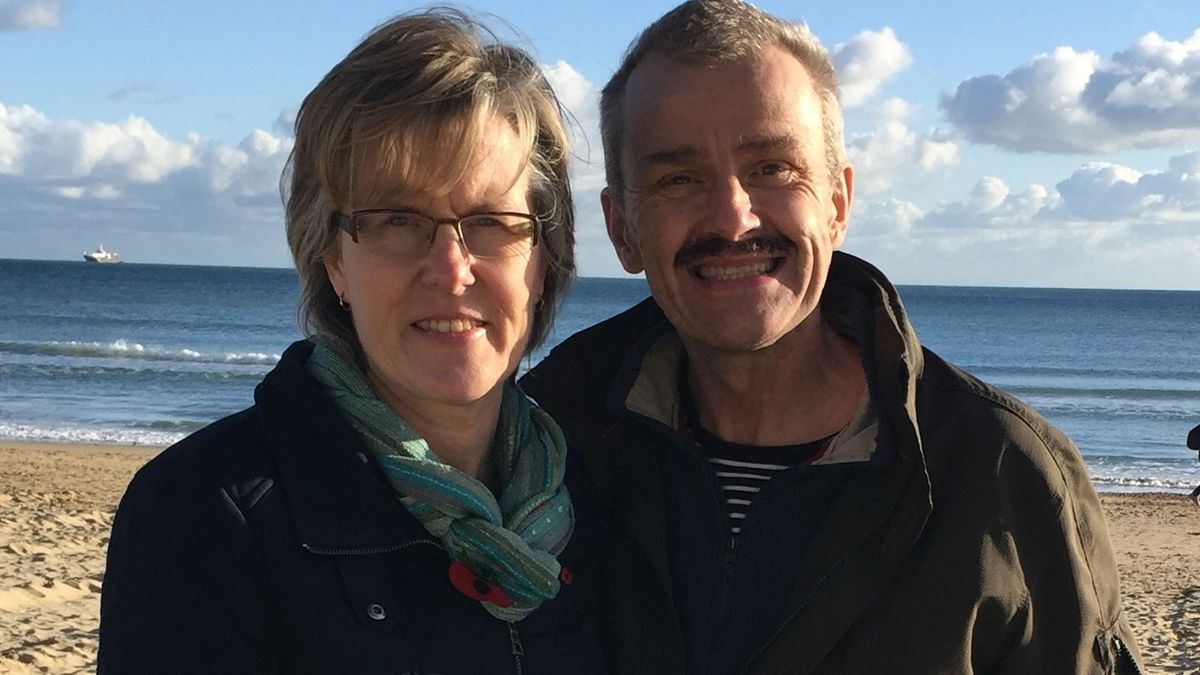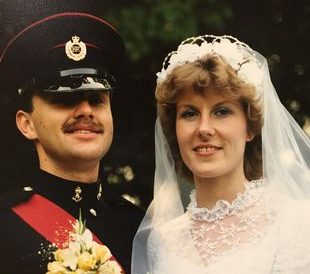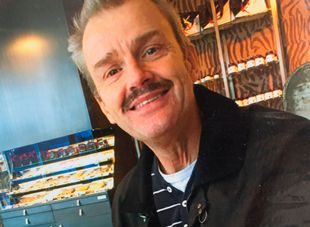
As I watched ’s Lenny reveal she was arranging an assisted death in Switzerland, I felt an overwhelming sympathy towards her character.
During the latest episode of the last night, we learnt – after weeks of secrecy and cryptic mentions of Zurich – she had been diagnosed with the incurable and ultimately terminal illness, .
For me, it was a case of art imitating life. Keith, my husband of 31 years, died at Dignitas five years ago, aged 59.
He was diagnosed in 2009 with a neurodegenerative condition – Huntington’s, which is a rare disease that causes the progressive breakdown of nerve cells in the brain.
As his condition worsened, it became hard for him to manage intricate tasks like changing a plug, he would drop things, choked on his food and regularly fell over. He said he felt as though he was ‘losing control of his life’.
Like Lenny, he too was determined to avoid a prolonged, traumatic death, having witnessed close family members endure the same.
He too had wanted control over a situation where that had been cruelly stripped away from him. And he too was denied the option he wanted at home by the cruel laws in this country, instead forced to look to Switzerland for the compassion and choice that should have been available here.

Needless to say, there are also huge differences between our story and this sensationalised prime-time drama.
Keith was a veteran from Berkshire, not a hot-shot London surgeon, for a start. Lenny has gone to extreme lengths to keep her plans a secret from everyone – even trying to divorce her husband, presumably in an attempt to protect him emotionally and legally – whereas Keith had my full knowledge and support once he had firmly made his decision.
But Lenny knows that if her husband was complicit in the decision, he could be seen as assisting her death and currently that could be punishable in England, Wales and Northern Ireland by 14 years in prison.
Keith was very concerned about whether our children and I would get into trouble upon our return to the UK, which gave him extra worry that he didn’t need. Thankfully, there was never a knock on the door and we were never questioned by the police.
The thought of losing Keith was heart-breaking of course, but his illness had already removed the possibility of us living together into old age or seeing our children have families of their own. What was devastating was the lengths Keith had to go to simply to die with dignity.
There are a lot of documents required by Dignitas to approve the request for an assisted death there and the thought of how we could get these together without letting the cat out of the bag of what Keith was planning was very daunting.
With assisted dying illegal in the UK, he was facing the possibility of suffering against his wishes just as his father, sister and brother had done from the same disease.
In early 2017, he began falling over and choking on his food, a sign the deterioration was quickening and a prompt for him to begin planning for the end. He raised the topic of Dignitas with me and at first I tried to put him off the idea.
Then, he attempted to take his own life. It was a wake-up call for all of us.
Last week, new data from the Office for National Statistics indicated that people with terminal illnesses are twice as likely than the general population to take their own life, and Dignity in Dying has estimated that up to 650 are doing so every year, with 10 times as many attempts.
I realised that if I wanted to protect Keith, I had to support him to pursue a safe, legal alternative abroad.
All in all, the Dignitas process cost us £13,000 – a luxury we were well aware that many families wouldn’t have.
We planned it in secret, lying to Keith’s doctors in case they reported us and scuppered his chance to die with dignity. We kept it from friends, denying Keith the opportunity to say goodbye, and even struggled to tell his brother, a police officer, in case it incriminated him.
Keith was eventually able to die peacefully on his own terms, with his family around him. But he shouldn’t have had to travel hundreds of miles to do so in an anonymous foreign clinic. He might even still be alive today had the option been available in this country in his final months.

Like so many, he felt he had to act early in case his health suddenly deteriorated and he wasn’t able to make the journey. It appears that Lenny in The Split may have to contemplate the same kind of ‘pre-emptive strike’, as Hannah put it.
At its core, The Split is not just about divorce but about life not going to plan. It’s about navigating the twists and turns, coming to terms with what we can’t control and working out what we can.
If you are dealt the blow of a terminal diagnosis, it can feel that all control has been cruelly taken from you. But assisted dying can give that back.
It gave Keith the peace of mind he needed; it gave him a good death but also allowed him to have a better life as he died. Isn’t that what we all want for ourselves and our loved ones?
How can we justify telling the terminally-ill they must suffer unbearably for the last months, weeks or hours of their life, when an assisted death is a much more compassionate alternative?
If you’ve been touched by Lenny’s story, know that for every fictional depiction, there are countless families like mine who have experienced these horrors first-hand.
Help us secure a debate on assisted dying in Parliament – .
Do you have a story you’d like to share? Get in touch by emailing [email protected].
Share your views in the comments below.




















